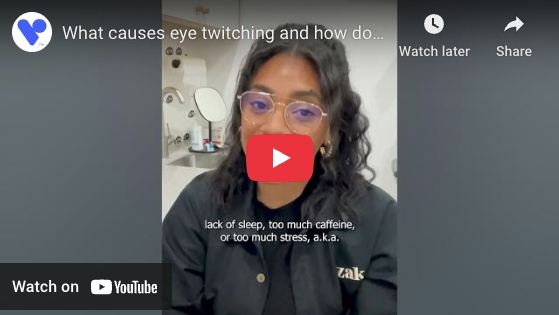Ask An Eye Doc: What Causes Eye Twitching?
It’s likely happened to you. You’re deep in conversation with a friend over coffee when all of a sudden, your eye twitches uncontrollably! You try to control it, but it keeps twitching. Moments later, it passes. Later that day, it happens again. What’s going on?
What is Eyelid Twitching?
Eyelid twitching or “Eyelid Myokymia” are benign involuntary muscle spasms or contractions of the eyelid. Benign means they’re not harmful, and involuntary means you can’t control them. Typically, these muscle spasms are localized to the lower eyelid and can occur in either eye or both. In most cases, minor eye twitching resolves as spontaneously as it began and isn’t associated with any disease. However, minor eye twitching can be hard to treat since there’s only one way to end it: figure out the cause and deal with it appropriately.
What Causes Eyelid Twitching?
Most people will experience eyelid twitching in their lifetime, as there are a variety of external factors that can account for twitching eyes. Fatigue, stress, eye strain, and caffeine or alcohol consumption are the most common sources of eye twitching. Eye strain or vision-related stress can occur if you need glasses, a new prescription, or are consistently working in front of a computer.
There are some cases where eye twitching is more than a temporary annoyance or may be a sign of a more problematic eye condition. If the problem continues following the use of over-the-counter artificial tears, hot and cold compresses, or lid cream or cleanser, you should follow up with your eye care provider.
Treatment for Eye Twitching
Dr. Danielle Richardson, a VSP network doctor who practices in Los Angeles, California, advises her patients to consider their sleep habits, caffeine and water consumption, and stress level if their eyelid twitching has become more frequent.
“Typically, getting more sleep, increasing hydration, decreasing caffeine, and trying to reduce stressors in your life will help cut down the frequency of eyelid twitching,” Dr. Richardson said. “Some of my patients have also seen success following ‘wives tale remedies’, which include drinking tonic water or taking magnesium supplements.”
Dr. Richardson recommends scheduling an appointment with your VSP network doctor if eyelid twitching lasts weeks to months or if you experience any of the following symptoms:
- Twitching lasting longer than 72 hours that completely closes an eyelid
- Spasms that involve other facial muscles
- Redness, swelling, or discharge from an eye or a droopy upper eyelid
Information received through VSP Vision Care channels is for informational purposes only and does not constitute medical advice, medical recommendations, diagnosis or treatment. Always seek the advice of your eye doctor, physician or other qualified health provider with any questions you may have regarding a medical condition.


